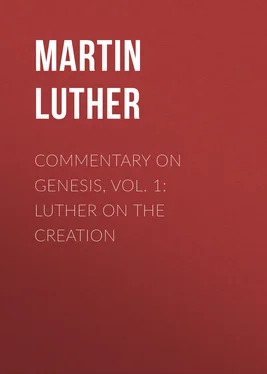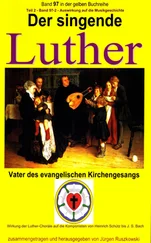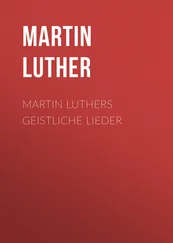Martin Luther - Commentary on Genesis, Vol. 1 - Luther on the Creation
Здесь есть возможность читать онлайн «Martin Luther - Commentary on Genesis, Vol. 1 - Luther on the Creation» — ознакомительный отрывок электронной книги совершенно бесплатно, а после прочтения отрывка купить полную версию. В некоторых случаях можно слушать аудио, скачать через торрент в формате fb2 и присутствует краткое содержание. Жанр: foreign_prose, foreign_religion, Философия, foreign_psychology, foreign_antique, на немецком языке. Описание произведения, (предисловие) а так же отзывы посетителей доступны на портале библиотеки ЛибКат.
- Название:Commentary on Genesis, Vol. 1: Luther on the Creation
- Автор:
- Жанр:
- Год:неизвестен
- ISBN:нет данных
- Рейтинг книги:4 / 5. Голосов: 1
-
Избранное:Добавить в избранное
- Отзывы:
-
Ваша оценка:
- 80
- 1
- 2
- 3
- 4
- 5
Commentary on Genesis, Vol. 1: Luther on the Creation: краткое содержание, описание и аннотация
Предлагаем к чтению аннотацию, описание, краткое содержание или предисловие (зависит от того, что написал сам автор книги «Commentary on Genesis, Vol. 1: Luther on the Creation»). Если вы не нашли необходимую информацию о книге — напишите в комментариях, мы постараемся отыскать её.
Commentary on Genesis, Vol. 1: Luther on the Creation — читать онлайн ознакомительный отрывок
Ниже представлен текст книги, разбитый по страницам. Система сохранения места последней прочитанной страницы, позволяет с удобством читать онлайн бесплатно книгу «Commentary on Genesis, Vol. 1: Luther on the Creation», без необходимости каждый раз заново искать на чём Вы остановились. Поставьте закладку, и сможете в любой момент перейти на страницу, на которой закончили чтение.
Интервал:
Закладка:
I have therefore thought it especially becoming and necessary to repeat here that admonition which I have frequently given, that we ought constantly to acquaint and familiarize ourselves with the phraseology of the Holy Spirit. For no one can successfully study any of the human arts unless he first correctly understands the idiom of the language in which its principles are described. For lawyers have their peculiar terms, unknown to the physician and the philosopher. In like manner, the latter have each a phraseology peculiar to themselves with which the professors of other arts have little or no acquaintance. Now one art ought not to perplex another. But every art ought to maintain its own course in its own way and to adopt its own peculiar terms.
Accordingly we find the Holy Spirit, to use a language and a phraseology peculiar to his own divine self, declaring that God created all things by his Word or by speaking them into being; "He spake and it was done"; that he wrought all things by his Word; and that all the works of God are certain words of God, certain things created by the uncreated word. As therefore the philosopher uses his own terms, so the Holy Ghost uses his. Hence when the astronomer speaks of his spheres, his cycles and his epicycles, he does so rightly, for it is lawful for him in the profession of his art to use such terms as may enable him the better to instruct his disciples. On the other hand the Holy Ghost will know nothing of such terms in the sacred Scriptures. Hence those Scriptures call the whole of that part of the creation which is above us, "The heaven," nor ought that term to be disapproved by the astronomer; for the astronomer and the Scripture both adopt, as I have said, terms peculiar to themselves.
It is in this manner that we are to understand the term "seasons" in the sacred text before us. For the term "season" with the philosopher and with the Hebrew has not the same signification. With the Jews the term "season" signifies, theologically, an appointed feast or festival; and also the intervals of days, which concur and conjoin to form the year, wherefore this term is everywhere rendered by the word "feast" or "festival" or "festivity"; except where it is used to signify a "tabernacle" or "tent."
I deemed it best to offer these admonitions concerning language and phraseology before we advance further, and I hope they will not be found useless or out of place, as showing the importance that every art should confine itself to its own language and terms; that no one art should condemn or deride another, but that each should rather aid the other and render mutual services. And this indeed the professors of all arts do, in order that the unity of the whole state may be preserved; which, as Aristotle says, "cannot be constituted of a physician and a physician; but must be formed of a physician and a husbandman."
PART V. GOD'S WORK ON THE FIFTH DAY
I. V. 20. And God said, Let the waters swarm with swarms of living creatures, and let birds fly above the earth, etc., etc.
We see Moses retains invariably the same sacred phraseology, "And God said," etc. Hitherto he has been speaking of the superior creatures; the heaven with all its host of planets and stars, which God created out of water by the Word, and gave light unto it, just as we now see the air around us lucid, with a natural illumination.
Moses now proceeds to speak of new creatures also produced out of the waters; namely, of birds and fishes. He connects these two creatures in his narrative on account of their similarity of nature. For as the fish swims in the water, so does the bird swim as it were in the air. Though their flesh differs, yet they have the same origin. For the sacred text is here quite plain, that the birds when created out of the waters immediately flew into the air where they now live. Moses here retains moreover his uniform term in calling the whole region above us, "heaven."
And first it is worthy of admiration that, although the fishes and the birds were both created out of the same matter, the waters, yet as the bird cannot live in the water, neither can the fish exist, if brought into the air. Physicians rightly argue, when they affirm that the flesh of birds is more wholesome than that of fishes, even though the nature of birds is also aqueous; because they live in a more rarified element; for air is a purer element than water; the latter, in which the fish are generated and live, being constituted of the dregs as it were of the former. Philosophers however do not believe this identity of the nature of birds and of fishes. But the faith of the sacred Scriptures which is far above philosophy and far more certain, assures us that the nature of the fish and of the bird had the same origin.
Here again is a further proof of the divine authority and majesty of this book, in that it sets before us under such various forms that power of God by which he created all things, beyond the conception of all reason and understanding. Who for instance could ever have thought, that out of water a nature could be produced, which should by no means endure water? But the Word of God speaks, and in a moment out of water are created birds. If therefore the Word of God but sound, all things are immediately possible; and out of the same water shall be formed either fishes or birds. Every bird therefore and every fish is nothing more or less than a word of divine grammar or language; by which grammar all things, otherwise impossible, immediately become possible and easy; by which also things contrary and conflicting become similar and harmonious; and vice versa.
But these divine things are thus written and ought to be diligently observed, studied and known by us, that we might learn to admire and adore the power of the Divine Majesty; and that we might edify and strengthen our faith from all these marvellous creation works of God! For if one could raise the dead it would be nothing in comparison to this wonderful work; that a bird was created in a moment out of water! But the reason we do not day by day and continually wonder at these things, is because by our having seen them always before us, they have lost their wonder in our eyes. If however one does but believe these things, he is compelled at once to wonder at them. And that wonder gradually confirms his faith. For if God can form a mass of water, call forth and create the heaven and its stars, each one of which equals or exceeds the earth itself in magnitude; if God can, from a small drop of water, create the sun and the moon, can he not defend my poor body against all enemies and against Satan himself? Can he not after that poor body is laid in the tomb raise it again to another and a new life? Wherefore we are to learn from this book of Genesis the power of God; that we may accustom ourselves to doubt nothing that God promises in his Word! For, in this glorious and marvellous creation work is laid a confirmation of our faith in all the promises of God; that there is nothing so difficult, nothing so impossible, which God cannot do and perfect by his Word. For all this is here proved by God's creation of the heaven, earth, sea and all that is in them.
But we must here touch upon that which has arrested the attention of the holy fathers, and especially of Augustine; that Moses in this sacred narrative uses these three expressions in reference to God, "God said;" "God made;" and "God saw;" as if God designed by these three expressions, used by His servant Moses, to set forth the three persons of the divine majesty! Thus by the expression "said" is signified the Father. The Father begat the Word from all eternity; and by this same Word he made in time this world. And these holy fathers applied the expression, "God made" to the person of the Son; for the Son has in himself the "express image" of the person of the Father; not only of his majesty, but of his power by which he created all things. Hence the Son gives to all things their existence. And as by the Father things are spoken into being, so are they also by the Son or the Word of the Father, by whom "all things subsist." And to these two persons is also added a third; the person of the Holy Spirit, who "sees" and approves all things which are created.
Читать дальшеИнтервал:
Закладка:
Похожие книги на «Commentary on Genesis, Vol. 1: Luther on the Creation»
Представляем Вашему вниманию похожие книги на «Commentary on Genesis, Vol. 1: Luther on the Creation» списком для выбора. Мы отобрали схожую по названию и смыслу литературу в надежде предоставить читателям больше вариантов отыскать новые, интересные, ещё непрочитанные произведения.
Обсуждение, отзывы о книге «Commentary on Genesis, Vol. 1: Luther on the Creation» и просто собственные мнения читателей. Оставьте ваши комментарии, напишите, что Вы думаете о произведении, его смысле или главных героях. Укажите что конкретно понравилось, а что нет, и почему Вы так считаете.












